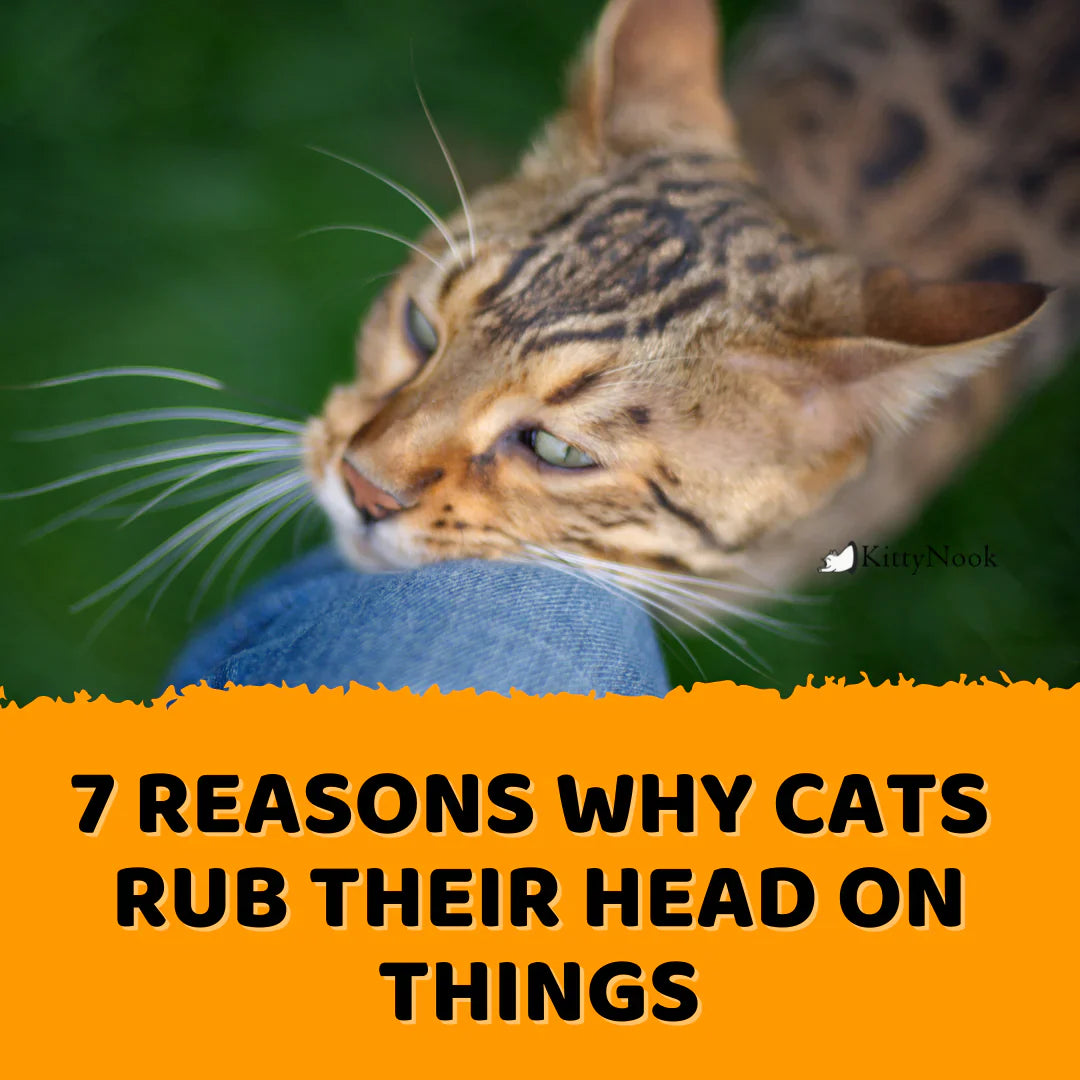Picture a scene with a cat rubbing its head against a furniture corner. Isn't it adorable?
We know cats love rubbing their heads on furniture, walls, or even their people. But why this enigmatic gesture? This time on the blog, join us on a whiskered trip as we untangle why cats rub their heads on things.
First Off, the Gesture is Called Bunting. And Here's the Science Behind It.

When a cat shows up and passionately head butts you, this is their way to bond. Like many pets, cats utilize scents to connect and converse with other cats. They use pheromones to mark their areas, connect, and send different messages. Bunting is one of the ways cats can spread their pheromones around, broadcasting their feelings or letting other cats know that they were in the area first.
Cat mamas also show their little kittens that head rubbing can be a way to show love, so when they find a human they rely on, they rub their heads on the said human.
It's similar to when your cat makes biscuits on your lap. They use the pheromones released by glands in their paw pads to mark you as a safe space for them. If your fur friend starts to rub their face on you, take it as a compliment.
That said, not every cat bunting on you wants pets. There are other reasons cats might rub their heads on things and people. Read on to know more!
Reasons for Cat Bunting

Felines rub their faces on things and people for several reasons, depending on the context. Let's explore some of those reasons together, shall we?
1. Marking A Territory

Cats sometimes bunt to notify other cats of their existence. Bunting might also be a kind of "time-stamping," which lets other cats know how recently another cat was there. If the mark is relatively fresh, other cats might intend to leave the area to avoid potential fights. Still, some cats bunt when they are anxious. Spreading their scent around may be a way of coping or making themselves more comfortable in an alien environment.
2. Getting Information (aka Scents)

Bunting on objects may also allow cats to pick up scents. For example, when a cat bunts their head on their owner, they transfer and get scents from its owner. This may also be similar when they bunt on objects.
3. Finding Mates

Felines rubbing their heads on objects is one-way unneutered cats offer visual hints to other felines throughout the mating period. Tom cats are more curious about female bunt marks throughout the mating season, which suggests the female's scent changes to attract male passion.
4. Your Cat May be Picking Up on Your Body Language

Even if cats seem to ignore humans, it does not mean they are unaware of what we are trying to connect. It is proven that cats form a bond with their owners.
Another stereotype of cats is that they are unbothered. They (in)famously tolerate people, unlike dogs, who crave human affection. However, studies show that cats develop strong bonds with their human parents. When cats and kittens were separated from their pet parents and later reunited, the cats displayed "distinct attachment styles towards human caregivers." Many cats are calmer and are more willing to explore unfamiliar areas when someone familiar is nearby. This suggests a sense of attachment to their humans. And that the presence of someone familiar makes them feel safe.
5. Bunting as a Form of Greeting

Cats who rub their faces on humans might also show affection through greeting gestures. Cats who belong in colonies usually bunt each other as a form of greeting.
Often, a cat bunting against your leg has a positive meaning. Bunting as a greeting means that your cat is happy to see you. You might notice more head rubbing when you haven't seen each other for longer.
6. Informing You That They Need Something

Pet parents wish cats would speak to them and tell them what they need. But cats do have body language to get these messages across. Bunting is one of the many ways they try to speak to humans.
If your cat is rubbing on the closet containing their food/treats, they may be telling you that they are hungry. In some cases, cats will aggressively bunt their humans to signal that something is wrong. It could mean they are unwell, but it could also just be a gentle reminder to clean their litter box, or that they need fresh water.
That's why you must learn your cat's behavioral patterns and prompts to recognize when they need something from you.
7. Your Cat May be Anxious

Stressed-out cats often bunt on objects because they're trying to make themselves feel safer. Spreading their scent around can help make unfamiliar surroundings more familiar and thus make them feel safer. But some cats simply like to rub their faces on things, so it might be tough to tell the difference. If your cat is stressed or anxious in any way, you will notice other indicators, such as overgrooming, aggressive behaviors, hiding or trying to flee, together with excessive bunting.
How to Respond to a Cat's Bunting

If your cat is rubbing their head against you, it is essential to respond accordingly. One way is to pet your cat, enhancing your bond. You can also speak to your cat in a comforting voice.
Remember that if your cat is scrubbing their head on objects excessively, it might mean that they're feeling distressed. In this situation, it's best to try to recognize the source of their stress and anxiety and provide them comfort and peace of mind.
We hope that this information is helpful to new cat parents wanting to connect with their fur friends. Share your thoughts in the comments below and help other cat parents!





















